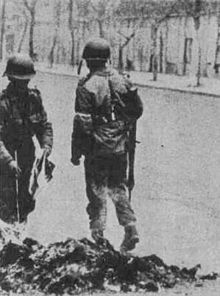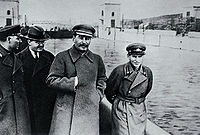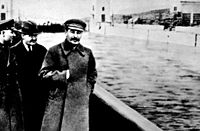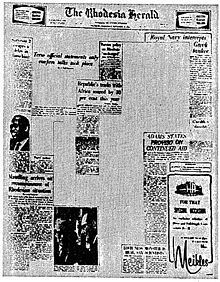- Censorship
-
Part of a series on Censorship By media Banned books · Banned films
Re-edited film · Internet
Music · Press · Radio · Thought
Speech and expression
Video gamesMethods Bleeping · Book burning
Broadcast delay · Chilling effect
Concision · Conspiracy of silence
Content-control software
Euphemism · Expurgation
Gag order · Heckling
Internet censorship circumvention
Memory hole · Newspaper theft
Pixelization · Political correctness
Postal · Prior restraint
Propaganda model
Revisionism · Sanitization/Redaction
Self-censorship · Speech code
Strategic lawsuit · Verbal offence
WhitewashingContexts Corporate · Political · Religious
Ideological · Criminal speech
Hate speech · Media bias
Suppression of dissent · Systemic biasBy country Censorship · Freedom of speech
Internet censorshipCensorship is speech or other public communication which may be considered objectionable, harmful, sensitive, or inconvenient to the general body of people as determined by a government, media outlet, or other controlling body.
Contents
Rationale
The rationale for censorship is different for various types of information censored:
- Moral censorship is the removal of materials that are obscene or otherwise considered morally questionable. Pornography, for example, is often censored under this rationale, especially child pornography, which is illegal and censored in most jurisdictions in the world.[1][2]
- Military censorship is the process of keeping military intelligence and tactics confidential and away from the enemy. This is used to counter espionage, which is the process of gleaning military information.
- Political censorship occurs when governments hold back information from their citizens. This is often done to exert control over the populace and prevent free expression that might foment rebellion.
- Religious censorship is the means by which any material considered objectionable by a certain faith is removed. This often involves a dominant religion forcing limitations on less prevalent ones. Alternatively, one religion may shun the works of another when they believe the content is not appropriate for their faith.
- Corporate censorship is the process by which editors in corporate media outlets intervene to disrupt the publishing of information that portrays their business or business partners in a negative light,[3][4] or intervene to prevent alternate offers from reaching public exposure.[5]
Types
Political
Nikolai Yezhov, standing to the right of Joseph Stalin, was shot in 1940. He was edited out of the photo by Soviet censors after his execution as a form of damnatio memoriae.[6] This policy was commonly applied to executed political enemies during Stalin's reign.Main article: Political censorshipSee also: Eastern Bloc information dissemination, Censorship in Cuba, Censorship in the People's Republic of China, and Censorship in North KoreaStrict censorship existed in the Eastern Bloc.[7] Throughout the bloc, the various ministries of culture held a tight rein on their writers.[8] Cultural products there reflected the propaganda needs of the state.[8] Party-approved censors exercised strict control in the early years.[9] In the Stalinist period, even the weather forecasts were changed if they had the temerity to suggest that the sun might not shine on May Day.[9] Under Nicolae Ceauşescu in Romania, weather reports were doctored so that the temperatures were not seen to rise above or fall below the levels which dictated that work must stop.[9]
Independent journalism did not exist in the Soviet Union until Mikhail Gorbachev became its leader; all reporting was directed by the Communist Party or related organizations. Pravda, the predominant newspaper in the Soviet Union, had a monopoly. Foreign newspapers were available only if they were published by Communist Parties sympathetic to the Soviet Union.
Possession and use of copying machines was tightly controlled in order to hinder production and distribution of samizdat, illegal self-published books and magazines. Possession of even a single samizdat manuscript such as a book by Andrei Sinyavsky was a serious crime which might involve a visit from the KGB. Another outlet for works which did not find favor with the authorities was publishing abroad.
The People's Republic of China, which continues Communist rule in politics, if not in the controlled economy, employs some 30,000 'Internet police'[citation needed] to monitor the internet and popular search engines such as Google and Yahoo.
Iraq under Baathist Saddam Hussein had much the same techniques of press censorship as did Romania under Nicolae Ceauşescu but with greater potential violence.[citation needed]
Cuban media is operated under the supervision of the Communist Party's Department of Revolutionary Orientation, which "develops and coordinates propaganda strategies".[10] Connection to the Internet is restricted and censored.[11]
Censorship also takes place in capitalist nations, such as Uruguay. In 1973, a military coup took power in Uruguay, and the State practiced censorship. For example, writer Eduardo Galeano was imprisoned and later was forced to flee. His book Open Veins of Latin America was banned by the right-wing military government, not only in Uruguay, but also in Chile and Argentina.[12]
Critics of the Campaign finance reform in the United States claim that this reform imposes widespread restrictions on political speech.[13][14]
State secrets and prevention of attention
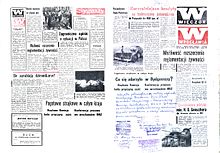 Wieczór Wrocławia - Daily newspaper of Wrocław, People's Republic of Poland, March 20–21, 1981, with censor intervention on first and last pages --- under the headlines "Co zdarzyło się w Bydgoszczy?" (What happened in Bydgoszcz?) and "Pogotowie strajkowe w całym kraju" (Country-wide strike alert). The censor had removed a section regarding the strike alert; hence the workers in the printing house blanked out an official propaganda section. The right-hand page also includes a hand-written confirmation of that decision by the local "Solidarność" Trade Union.
Wieczór Wrocławia - Daily newspaper of Wrocław, People's Republic of Poland, March 20–21, 1981, with censor intervention on first and last pages --- under the headlines "Co zdarzyło się w Bydgoszczy?" (What happened in Bydgoszcz?) and "Pogotowie strajkowe w całym kraju" (Country-wide strike alert). The censor had removed a section regarding the strike alert; hence the workers in the printing house blanked out an official propaganda section. The right-hand page also includes a hand-written confirmation of that decision by the local "Solidarność" Trade Union.
In wartime, explicit censorship is carried out with the intent of preventing the release of information that might be useful to an enemy. Typically it involves keeping times or locations secret, or delaying the release of information (e.g., an operational objective) until it is of no possible use to enemy forces. The moral issues here are often seen as somewhat different, as the proponents of this form of censorship argues that release of tactical information usually presents a greater risk of casualties among one's own forces and could possibly lead to loss of the overall conflict.
During World War I letters written by British soldiers would have to go through censorship. This consisted of officers going through letters with a black marker and crossing out anything which might compromise operational secrecy before the letter was sent. The World War II catchphrase "Loose lips sink ships" was used as a common justification to exercise official wartime censorship and encourage individual restraint when sharing potentially sensitive information.
An example of "sanitization" policies comes from the USSR under Joseph Stalin, where publicly used photographs were often altered to remove people whom Stalin had condemned to execution. Though past photographs may have been remembered or kept, this deliberate and systematic alteration to all of history in the public mind is seen as one of the central themes of Stalinism and totalitarianism.
Censorship is occasionally carried out to aid authorities or to protect an individual, as with some kidnappings when attention and media coverage of the victim can sometimes be seen as unhelpful.[15][16]
Educational sources
File:Natgeo censorship.jpgA National Geographic Magazine censored by the Nashravaran Journalistic Institute. The offending cover was about the subject of love, and the picture hidden beneath the white sticker is of an embracing couple.[17] February 2006.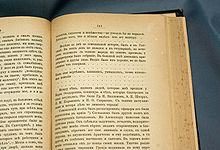 Historic russian censorship. Book "Notes of my life by N.I. Grech", published in St. Petersburg 1886 by A.S. Suvorin. The censored text was replaced by dots.
Historic russian censorship. Book "Notes of my life by N.I. Grech", published in St. Petersburg 1886 by A.S. Suvorin. The censored text was replaced by dots.
The content of school textbooks is often the issue of debate, since their target audience is young people, and the term "whitewashing" is the one commonly used to refer to removal of critical or conflicting events. The reporting of military atrocities in history is extremely controversial, as in the case of The Holocaust (or Holocaust denial), Bombing of Dresden, the Nanking Massacre as found with Japanese history textbook controversies, the Armenian Genocide, the Tiananmen Square protests of 1989, and the Winter Soldier Investigation of the Vietnam War.
In the context of secondary school education, the way facts and history are presented greatly influences the interpretation of contemporary thought, opinion and socialization. One argument for censoring the type of information disseminated is based on the inappropriate quality of such material for the young. The use of the "inappropriate" distinction is in itself controversial, as it changed heavily. A Ballantine Books version of the book Fahrenheit 451 which is the version used by most school classes[18] contained approximately 75 separate edits, omissions, and changes from the original Bradbury manuscript.
Music and popular culture
See also: Censorship of musicMusic censorship has been implemented by states, religions, educational systems, families, retailers and lobbying groups – and in most cases they violate international conventions of human rights.[19]
Aside from the usual justifications of pornography, language and violence, some movies are censored due to changing racial attitudes or political correctness in order to avoid ethnic stereotyping and/or ethnic offense despite its historical or artistic value. One example is the still withdrawn "Censored Eleven" series of animated cartoons, which may have been innocent then, but are "incorrect" now.
Copy, picture, and writer approval
Copy approval is the right to read and amend an article, usually an interview, before publication. Many publications refuse to give copy approval but it is increasingly becoming common practice when dealing with publicity anxious celebrities.[20] Picture approval is the right given to an individual to choose which photos will be published and which will not. Robert Redford is well known for insisting upon picture approval.[21] Writer approval is when writers are chosen based on whether they will write flattering articles or not. Hollywood publicist Pat Kingsley is known for banning certain writers who wrote undesirably about one of her clients from interviewing any of her other clients.[citation needed]
Maps
Main article: Censorship of mapsCensorship of maps is often employed for military purposes. For example, the technique was used in former East Germany, especially for the areas near the border to West Germany in order to make attempts of defection more difficult. Censorship of maps is also applied by Google maps, where certain areas are grayed out or areas are purposely left out-dated with old imagery.[22]
Meta-censorship
In this form of censorship, any information about existence of censorship and the legal basis of the censorship is censored, rules of censoring are classified, and removed texts or phrases are not marked.
Creative censorship
There are many ways that censors exhibit creativity, but a specific variant is of concern in which censors rewrite texts, giving these texts secret co-authors. This form of censorship is used in the novel Nineteen Eighty-Four.[citation needed][original research?]
Internet censorship
Main article: Internet censorship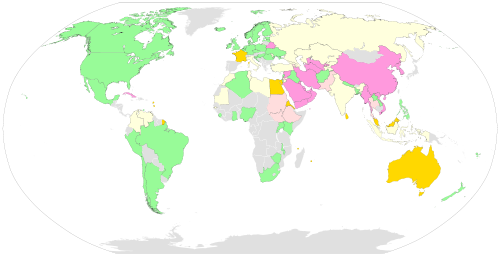

Internet censorship by country Persuasive censorshipSubstantial censorshipSelective censorshipUnder surveillanceNo evidence of censorshipNot classified / No dataInternet censorship in Tunisia, Egypt, and Libya has changed since the Arab Spring of 2011. Internet censorship is control or suppression of the publishing or accessing of information on the Internet. It may be carried out by governments or by private organizations either at the behest of government or on their own initiative. Individuals and organizations may engage in self-censorship on their own or due to intimidation and fear.
The issues associated with Internet censorship are similar to those for offline censorship of more traditional media. One difference is that national borders are more permeable online: residents of a country that bans certain information can find it on websites hosted outside the country. Thus censors must work to prevent access to information even though they lack physical or legal control over the websites themselves. This in turn requires the use of technical censorship methods that are unique to the Internet, such as site blocking and content filtering.[23]
Unless the censor has total control over all Internet-connected computers, such as in North Korea or Cuba, total censorship of information is very difficult or impossible to achieve due to the underlying distributed technology of the Internet. Pseudonymity and data havens (such as Freenet) protect free speech using technologies that guarantee material cannot be removed and prevents the identification of authors. Technologically savvy users can often find ways to access blocked content. Never-the-less, blocking remains an effective means of limiting access to sensitive information for most users when censors, such as those in China, are able to devote significant resources to building and maintaining a comprehensive censorship system.[23]
Views about the feasibility and effectiveness of Internet censorship have evolved in parallel with the development of the Internet and censorship technologies:
- A 1993 Time Magazine article quotes computer scientist John Gillmore, one of the founders of the Electronic Frontier Foundation, as saying "The Net interprets censorship as damage and routes around it."[24]
- In November 2007, "Father of the Internet" Vint Cerf stated that he sees government control of the Internet failing because the Web is almost entirely privately owned.[25]
- A report of research conducted in 2007 and published in 2009 by the Beckman Center for Internet & Society at Harvard University stated that: "We are confident that the [censorship circumvention] tool developers will for the most part keep ahead of the governments' blocking efforts", but also that "...we believe that less than two percent of all filtered Internet users use circumvention tools".[26]
- In contrast, a 2011 report by researchers at the Oxford Internet Institute published by UNESCO concludes "... the control of information on the Internet and Web is certainly feasible, and technological advances do not therefore guarantee greater freedom of speech."[23]
A BBC World Service poll of 27,973 adults in 26 countries, including 14,306 Internet users,[27] was conducted between 30 November 2009 and 7 February 2010. The head of the polling organization felt, overall, that the poll showed that:
- Despite worries about privacy and fraud, people around the world see access to the internet as their fundamental right. They think the web is a force for good, and most don’t want governments to regulate it.[28]
The poll found that nearly four in five (78%) Internet users felt that the Internet had brought them greater freedom, that most Internet users (53%) felt that "the internet should never be regulated by any level of government anywhere", and almost four in five Internet users and non-users around the world felt that access to the Internet was a fundamental right (50% strongly agreed, 29% somewhat agreed, 9% somewhat disagreed, 6% strongly disagreed, and 6% gave no opinion).[29]
Implementation
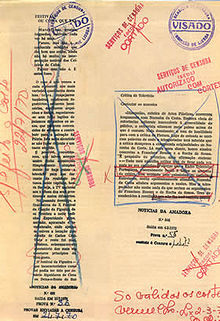 Censored pre-press proof of two articles from "Notícias da Amadora", a Portuguese newspaper, 1970
Censored pre-press proof of two articles from "Notícias da Amadora", a Portuguese newspaper, 1970
The former Soviet Union maintained a particularly extensive program of state-imposed censorship. The main organ for official censorship in the Soviet Union was the Chief Agency for Protection of Military and State Secrets generally known as the Glavlit, its Russian acronym. The Glavlit handled censorship matters arising from domestic writings of just about any kind—even beer and vodka labels. Glavlit censorship personnel were present in every large Soviet publishing house or newspaper; the agency employed some 70,000 censors to review information before it was disseminated by publishing houses, editorial offices, and broadcasting studios. No mass medium escaped Glavlit's control. All press agencies and radio and television stations had Glavlit representatives on their editorial staffs.
Sometimes, a specific and unique information whose very existence is barely known to the public, is kept in a subtle, near-censorship situation, being regarded as "subversive" or "inconvenient". Michel Foucault's 1978 text "Sexual Morality and the Law" (later republished as "The Danger of Child Sexuality"), for instance - originally published as La loi de la pudeur [literally, "the law of decency"], defends the decriminalization of statutory rape and the abolition of age of consent laws.
When a publisher comes under pressure to suppress a book, but has already entered into a contract with the author, they will sometimes effectively censor the book by deliberately ordering a small print run and making minimal, if any, attempts to publicize it. This practice became known in the early 2000s as privishing.[30]
Censorship by country
Main article: Censorship by countryCensorship by country collects information on censorship, Internet censorship, Freedom of the Press, Freedom of speech, and Human Rights by country and presents it in a sortable table, together with links to articles with more information. In addition to countries, the table includes information on former countries, disputed countries, political sub-units within countries, and regional organizations.
See also
Related articles
Freedoms
- Academic freedom
- Freedom of the press
- Freedom of speech
- Freedom of thought
- Scientific freedom
Notes and references
- ^ http://www.missingkids.com/en_US/documents/CP_Legislation_Report.pdf
- ^ "World Congress against CSEC". Csecworldcongress.org. 2002-07-27. http://www.csecworldcongress.org/en/index.htm. Retrieved 2011-10-21.
- ^ Timothy Jay (2000). Why We Curse: A Neuro-psycho-social Theory of Speech. John Benjamins Publishing Company. pp. 208–209. ISBN 1556197586.
- ^ David Goldberg, Stefaan G. Verhulst, Tony Prosser (1998). Regulating the Changing Media: A Comparative Study. Oxford University Press. p. 207. ISBN 0198267819.
- ^ McCullagh, Declan (2003-06-30). "Microsoft's new push in Washington - CNET News". News.cnet.com. http://news.cnet.com/2010-1071_3-1021938.html. Retrieved 2011-10-21.
- ^ The Commissar vanishes (The Newseum)
- ^ Major & Mitter 2004, p. 6
- ^ a b Major & Mitter 2004, p. 15
- ^ a b c Crampton 1997, p. 247
- ^ "10 most censored countries". The Committee to Protect Journalists. http://www.cpj.org/censored/censored_06.html.
- ^ "Going online in Cuba: Internet under surveillance". Reporters Without Borders. 2006. http://www.rsf.org/IMG/pdf/rapport_gb_md_1.pdf.
- ^ "Fresh Off Worldwide Attention for Joining Obama's Book Collection, Uruguayan Author Eduardo Galeano Returns with "Mirrors: Stories of Almost Everyone"". Democracynow.org. http://www.democracynow.org/2009/5/28/eduardo. Retrieved 2011-10-21.
- ^ "The Trick of Campaign Finance Reform". Christian Science Monitor. http://www.giantleap.org/envision/campaign.htm.
- ^ "Felonious Advocacy". reason. http://www.reason.com/news/show/132594.html.
- ^ New York Times
- ^ The Raw Story | Investigative News and Politics
- ^ Lundqvist, J.. "More pictures of Iranian Censorship". http://viewsdesk.com/2006/more-pictures-of-iranian-censorship/. Retrieved August 2007-01-21.
- ^ Bradbury, Ray. Fahrenheit 451. Del Rey Books. April 1991.
- ^ "What is Music Censorship?". Freemuse.org. 1 January 2001. http://www.freemuse.org/sw2338.asp. Retrieved 2008-10-25.
- ^ Ian Mayes (2005-04-23). "The readers' editor on requests that are always refused". London: The Guardian. http://www.guardian.co.uk/comment/story/0,,1468351,00.html. Retrieved August 2007-01-21.
- ^ Barber, Lynn (2002-01-27). "Caution: big name ahead". London: The Observer. http://observer.guardian.co.uk/life/story/0,6903,639829,00.html. Retrieved August 2007-01-21.
- ^ Jenna Johnson (2007-07-22). "Google's View of D.C. Melds New and Sharp, Old and Fuzzy". News (Washington Post). http://www.washingtonpost.com/wp-dyn/content/article/2007/07/21/AR2007072101296.html. Retrieved 2007-07-22.
- ^ a b c Freedom of connection, freedom of expression: the changing legal and regulatory ecology shaping the Internet, Dutton, William H.; Dopatka, Anna; Law, Ginette; Nash, Victoria, Division for Freedom of Expression, Democracy and Peace, United Nations Educational, Scientific and Cultural Organization (UNESCO), Paris, 2011, 103 pp., ISBN 978-92-3-104188-4
- ^ "First Nation in Cyberspace", Philip Elmer-Dewitt, Time, 6 December 1993, No.49
- ^ "Cerf sees government control of Internet failing", Pedro Fonseca, Reuters, 14 November 2007
- ^ 2007 Circumvention Landscape Report: Methods, Uses, and Tools, Hal Roberts, Ethan Zuckerman, and John Palfrey, Beckman Center for Internet & Society at Harvard University, March 2009
- ^ For the BBC poll Internet users are those who used the Internet within the previous six months.
- ^ "BBC Internet Poll: Detailed Findings", BBC World Service, 8 March 2010
- ^ "Internet access is 'a fundamental right'", BBC News, 8 March 2010
- ^ Winkler, David (11 July 2002). "Journalists Thrown 'Into the Buzzsaw'". CommonDreams.org. http://www.commondreams.org/views02/0711-05.htm.
General information
 Censorship can limit communications
Censorship can limit communications
- Abbott, Randy. "A Critical Analysis of the Library-Related Literature Concerning Censorship in Public Libraries and Public School Libraries in the United States During the 1980s." Project for degree of Education Specialist, University of South Florida, December 1987. ED 308 864
- Burress, Lee. Battle of the Books. Metuchen, NJ: The Scarecrow Press, 1989. ED 308 508
- Butler, Judith, "Excitable Speech: A Politics of the Performative"(1997)
- Foucault, Michel, edited by Lawrence D. Kritzman. Philosophy, Culture: interviews and other writings 1977–1984 (New York/London: 1988, Routledge, ISBN 0-415-90082-4) (The text Sexual Morality and the Law is Chapter 16 of the book).
- O'Reilly, Robert C. & Parker, Larry. "Censorship or Curriculum Modification?" Paper presented at a School Boards Association, 1982, 14 p. ED 226 432
- Hansen, Terry. The Missing Times: News media complicity in the UFO cover-up, 2000. ISBN 0-7388-3612-5
- Hendrikson, Leslie. "Library Censorship: ERIC Digest No. 23." ERIC Clearinghouse for Social Studies/Social Science Education, Boulder, Colorado, November 1985. ED 264 165
- Hoffman, Frank. "Intellectual Freedom and Censorship." Metuchen, NJ: The Scarecrow Press, 1989. ED 307 652
- Marek, Kate. "Schoolbook Censorship USA." June 1987. ED 300 018
- Mathiesen, Kay Censorship and Access to Information HANDBOOK OF INFORMATION AND COMPUTER ETHICS, Kenneth E. Himma, Herman T. Tavani, eds., John Wiley and Sons, New York, 2008
- National Coalition against Censorship (NCAC). "Books on Trial: A Survey of Recent Cases." January 1985. ED 258 597
- Ringmar, Erik A Blogger's Manifesto: Free Speech and Censorship in the Age of the Internet (London: Anthem Press, 2007)
- Small, Robert C., Jr. "Preparing the New English Teacher to Deal with Censorship, or Will I Have to Face it Alone?" Annual Meeting of the National Council of Teachers of English, 1987, 16 p.
- (Arguing that an English teacher should get advice from school librarians in preparing to encounter three levels of censorship:
- Rejection of adolescent fiction and popular teen magazines as having low value,
- Experienced colleagues discouraging "difficult" lesson plans,
- Outside interest groups limiting students' exposure. ED 289 172)
- Supreme Court rejects advocates' plea to preserve useful formats
- Terry, John David II. "Censorship: Post Pico." In "School Law Update, 1986," edited by Thomas N. Jones and Darel P. Semler. ED 272 994
- World Book Encyclopedia, volume 3 (C-Ch), pages 345, 346
External links
Propaganda techniques Ad hominem · Bandwagon effect · Big Lie · Blood libel · Buzzword · Card stacking · Censorship · Code word · Dog-whistle politics · Doublespeak · Euphemism · Framing · Glittering generality · Historical revisionism · Ideograph · Indoctrination · Lawfare · Lesser of two evils principle · Limited hangout · Loaded language · Newspeak · Obscurantism · Plain folks · Public relations · Slogan · Spin · Weasel wordInternet censorship · Internet censorship by country Countries Afghanistan · Australia · Azerbaijan · Belarus · Bhutan · Brazil · Canada · China (Hong Kong) · Cuba · Denmark · Egypt · Finland · France · Germany · Iceland · India · Iran · Ireland · Italy · Kazakhstan · Malawi · Malaysia · Morocco · Myanmar · Nepal · New Zealand · North Korea · Pakistan · Romania · Saudi Arabia · Singapore · South Africa · South Korea · Sri Lanka · Syria · Thailand · Tunisia · Turkey · Turkmenistan · United Kingdom · United States · Uzbekistan · Venezuela · VietnamSites Categories:- Censorship
- Historical deletion
- Freedom of expression
Wikimedia Foundation. 2010.

